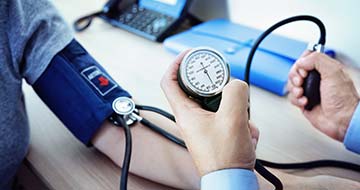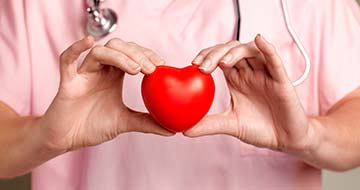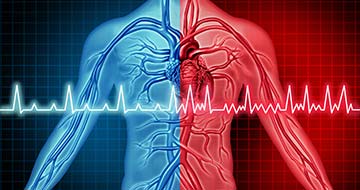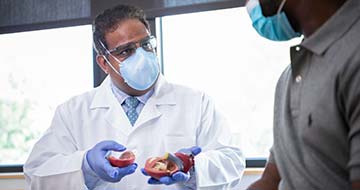Your Heart Is in the Right Place at Baptist Health System
Exciting advances in medicine and surgery allow people with heart problems to live longer and better than ever before. Whether you need routine care for an abnormal heart rhythm, a minimally invasive surgery to fix a blocked coronary artery or a heart valve that's not working properly, the Baptist Health System can help.
Our team of experienced cardiovascular doctors, nurses, and staff are here to deliver high-quality, compassionate valve and cardiovascular services that suit your needs, whether it’s for serious cardiac emergencies or complex surgeries. We offer comprehensive treatment options based on your condition, including lifestyle changes, prescription medicine intake, non-surgical procedures and minimally invasive surgical procedures.
Some of the cardiovascular conditions we help manage and treat are:
- Arrhythmia
- Atherosclerosis
- Carotid artery disease
- Coronary artery disease (including total occlusion)
- Chest pain
- Congestive heart failure
- Heart failure
- Blood clots in the veins
- Angina
- Aneurysm (swelling in the wall of an artery)
- Stroke
- Heart valve disease
- Irregular heartbeat, such as atrial fibrillation
- Varicose veins
- Vasculitis (blood vessel inflammation)
Baptist Health's heart and vascular specialists can sometimes provide research-driven medical treatments before they're available in other hospitals. We blend expert clinical care with the considerate, Southern Texan hospitality that San Antonio is known for. Here at Baptist Health System, treating your heart means treating you like family. That's the difference in our cardiac care. From our physicians, nurses and support staff, we are your Community Built on Care.
What Are Different Cardiac Procedures and Surgeries?
At Baptist Health System, we have board-certified cardiovascular doctors and surgeons that perform different cardiac procedures and surgeries, including:
- Angioplasty
- Atherectomy
- Bypass surgery
- Cardiac catheterization
- Cardiomyoplasty
- Catheter ablation
- Heart transplant
- Heart valve surgery
- Minimally invasive heart surgery
- Trans myocardial revascularization (TMR)
Why is Cardiovascular Health Important?
Staying on top of your cardiovascular health is important because your heart pushes blood to every part of your body. The blood also carries hormones, oxygen, essential cells, and other compounds that your body needs to function efficiently. This means that when your heart is unhealthy, it may also affect your bodily functions and lead to chronic health conditions. And when your heart stops, your blood flow may also stop almost instantly and lead to more complications.
You can keep your heart healthy by sustaining a healthy diet, exercising regularly, maintaining a healthy weight, not smoking, not drinking alcohol, preventing stress, and by seeing your cardiovascular doctor for a regular heart screening.
At What Age Should you See a Cardiologist?
Reaching middle age is the best time to start scheduling your annual heart screenings. For instance, the ideal age to start scheduling a cholesterol screening is 35 for men and 45 for women with no known risk factors for coronary heart disease. Men who have risk factors are recommended to schedule a cholesterol screening as early as age 20.
However, it's good to note that you may see a cardiovascular doctor at any age, as soon as you experience symptoms of a heart condition.
Facts about Heart Disease
Heart disease, also known as coronary heart disease (CHD), occurs when plaque (which is made up of fatty molecules, cholesterol, and minerals) builds up in your arteries and blood vessels and then leads to your heart. The Centers for Disease Control and Prevention says that heart disease is the #1 cause of death in the United States, accounting for about 25% of deaths in the country every year. In fact, in the U.S., one person dies from cardiovascular disease every 36 seconds.
Which Heart Tests Should You Take to Monitor Your Heart Health?
The following tests and screenings may help you and your doctor monitor your heart health and also detect heart or vascular disease:
- Blood glucose test
- Blood pressure screening
- Catheter angiography
- Cholesterol checks
- CT scan
- Electrocardiogram (ECG)
- Exercise stress test
- Heart screening
- Magnetic resonance imaging (MRI)
- MR angiography
- Venography
- Waist circumference evaluation
- Weight or BMI checks
Awards & Distinctions
Baptist Health System has received the following recognitions for our safe, high-quality cardiology services:
- Accredited Chest Pain Centers through the American College of Cardiology
- Afib Bronze Award — Get With The Guidelines® Stroke program by the American Heart Association
- Get with the Guidelines Stroke Target Stroke Honor Roll Elite Gold Plus Award (American Heart Association/American Stroke Association)
- High Performing Hospital for Heart Failure by U.S. & News & World Report
- The Joint Commission Disease Specific Certification for Advanced Primary Stroke Center
Learn more about our awards and distinctions.










